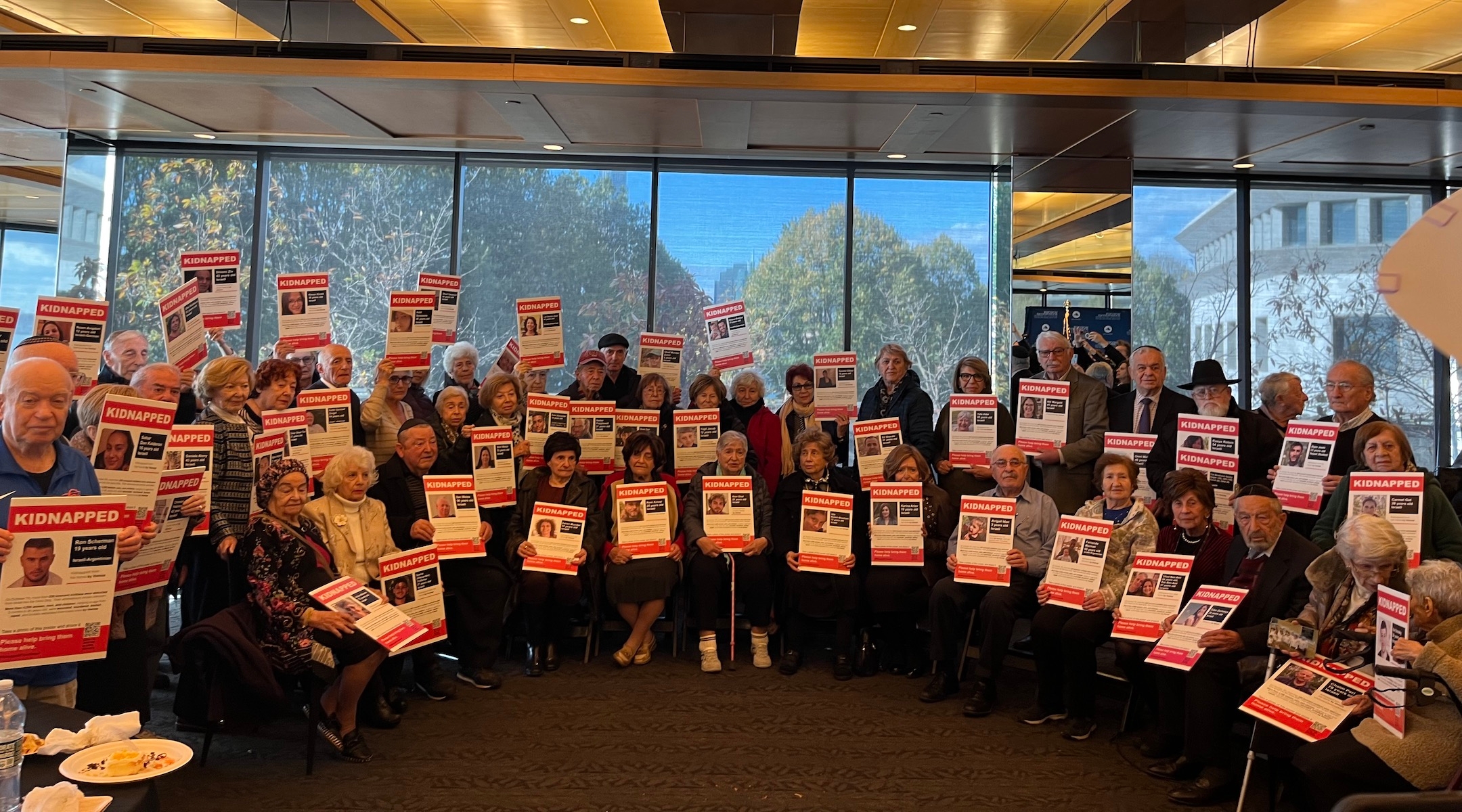Number of living Holocaust survivors is about 245,000, according to new analysis
The oldest known survivor is Rose Girone, 112, of Queens, New York. Her family escaped Germany in 1938 and lived out the war in Shanghai

A group of Holocaust survivors pose with posters of the hostages that were kidnapped by Hamas at the Museum of Jewish Heritage: A Living Memorial to the Holocaust, Nov. 1, 2023. (Julia Gergely)
(JTA) – Fewer than 250,000 Holocaust survivors remain alive today, according to an unprecedented new report by the organization that has sought to ensure that they are compensated for their suffering.
The oldest known survivor, according to the Conference on Jewish Material Claims Against Germany, is New Yorker Rose Girone, who turned 112 last week. She and her family fled Nazi Germany for Shanghai, where they endured terrible conditions before making their way to the United States.
“My mother will be the first to tell you, we’re very lucky all around,” said her daughter Reha Bennicasa, who at 85 is just below the median age of survivors today (86).
The Claims Conference has long shared basic information about who is receiving the aid it negotiates annually with Germany and offered a similar number of estimated survivors last year. But the new demographic overview is the first to break down the population of Jewish survivors by country of birth and current country of residence; age; gender; and the percentages receiving various compensations and services.
It identifies survivors in more than 90 countries: 49% reside in Israel, 18% in North America, another 18% in Western Europe; and 12% in the former Soviet Union.
The youngest are on the cusp of 80 — the Holocaust ended in 1945 — and, in a reflection of geriatric gender disparities, 61% are women.
The organization says the statistics show that the work of helping survivors is far from over. “Now is the time to double down on our attention on this waning population,” said Gideon Taylor, president of the Claims Conference. “Now is when they need us the most.”
The organization was founded in 1951 and over the decades has negotiated various compensation programs with the German government for survivors around the world, mostly distributed through local service agencies. Last year, the Claims Conference negotiated $1.4 billion in compensation, a record high that the group said was needed to cover the higher costs incurred by an aging population. (The organization also funds Holocaust education efforts.) Survivors receive an array of support, from direct payments and pensions to home care, food, medicine, transportation and social programs.
The new demographic report is based in part on information about Jews served by such programs. The data were combined with published reports on the numbers of recipients of compensation administered by Israel, Germany and Austria.
Though some survivors may choose not to be identified, there are still occasional applications for compensation, the Claims Conference reported. Even with a few new cases added, the overall survivor population is dwindling — an expected trend that has worried schools and synagogues that have depended on survivors to teach about the Holocaust.
The newly released data are “an important contribution in our obligation to the living witnesses that deserve any support they need in their remaining years,” Jewish demography expert Sergio DellaPergola of Hebrew University of Jerusalem’s Harman Institute of Contemporary Jewry said in a statement.
It’s important for people to look for the stories behind the numbers, said Bennicasa in a phone call from her home in Queens, New York.
“Given the declining survivor population and the rise in antisemitism, we need to encourage the world to learn about our collective history so that the Holocaust will never happen again,” she said.
Bennicasa was born in December 1938 in what was then the German city of Breslau (today Wroclaw, Poland). Her father, Julius Mannheim, was one of the 30,000 Jews imprisoned in concentrations camps in Germany at the time; like many of those arrested early in the Nazi campaign against the Jews, he was released from the Buchenwald camp on the condition that the family leave Germany.
After an arduous journey by ship, the family finally reached Shanghai, China — where some 20,000 Jews from Europe found refuge. The Japanese occupiers of Shanghai forced the Jewish refugees into ghettos, confiscating virtually everything they owned. For seven years, Bennicasa and her parents lived in a bathroom that was turned into a living space.
Still, she said, she and her mother feel lucky to have had the experience they did.
“Our experiences were not like people in camps, people that were branded in any fashion. Our experience was so different,” she said. “And for me as a child, whatever circumstances you’re given as a child, you accept them. This is your life.”
It was in Shanghai that Rose Girone (née Raubvogel) started knitting to earn a living. The skill served her well after the family left Shanghai for America in 1947. After a year, Rose divorced her husband. Some 10 years later, she married Jack Girone, and built up a knitting business in Queens, New York.
“Mother’s talents were quite well known, and whoever knit knew Rose’s Knitting Studio,” Bennicasa said. Her mother retired in 2002 and volunteered in a senior center teaching knitting until she fully retired at the age of 102, in 2014.
For the last two years, Rose has been living in a nursing home, where she is currently recovering from a brief illness. “She goes with the flow and rolls with the punches,” said Bennicasa, who tries to follow her mother’s advice: “Don’t ever get up without a purpose. You have to have a purpose every day.”
This article originally appeared on JTA.org.















